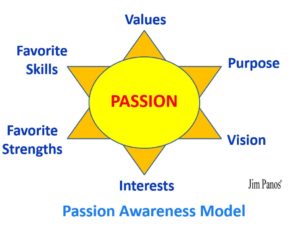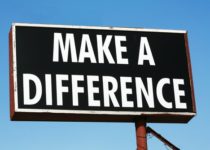Do You Want Career Clarity? Then, Ignore Personality Tests & Discover Your Passion – Part of Chapter IV of the upcoming book Find Your Passion
Do You Want Career Clarity? Then, Ignore Personality Tests & Discover Your Passion – Part of Chapter IV of the upcoming book “Find Your Passion” –
Awareness
Great job! You did it! You’re all set now for your “Peace Time” trip, your inspiration! You are ready to give your mind some time to wander, relax, reflect on yourself, and get inspired!
What will you do during your trip? You’ll ground yourself and get inspired. Pick a place for your “Passion-work”; any place where you feel relaxed and have full privacy. Plus, if you find one where you don’t feel super comfortable, great! A little bit of discomfort is necessary for you to have new insights on your career and life.
Remember that passion consists of 6 key components? That is your:
I. Values
II. Purpose
III. Vision
IV. Interests
V. Favorite Strengths
VI. Favorite Skills
Remember that any of them can change over time because you and your personal circumstances change. So does your passion. All of your passion’s components have two main qualities. They’re: a) dynamic and b) unique; exactly as your passion. In other words, they can change anytime in the future and are personal, exclusively defined by you; your life circumstances, your mentality, your being. You’ll discover all your passion key components once we go through the “Find Your P.A.S.S.I.O.N method”. Have a look once again at the Passion Awareness model:

The “Passion Awareness Model” is what I wish I had as a tool to discover my passion. Unfortunately, there wasn’t such a tool. That’s why I created it. What I had instead were the traditional “professional orientation” and “personality tests”. Yes, the ones that date back to the industrialization era (where work was slavery), but are still used today by the majority of businesses for hiring, employee engagement, and productivity. They’re also used in primary, secondary, and higher education!
Now, don’t get me wrong. They are better than nothing. My question is “Why don’t we make them not only better, but inconceivable? Why don’t we change our perspective and put one’s natural talents and genius at the core of a person’s career and true potential? That’s why I created it. Plus, it’ll save you lots of money, time, and energy. Yes, you don’t have to jump from job to job, role to role, business to business in order to get the clarity you want. Is it better than nothing? Sure. But the “trial-error” approach in your career will cost you more time, energy, and money. Given that our time is limited, can you really afford to rely on methods that not only are not enough, but they might also create even more confusion for you? And actually, cost you even more time, money, and energy? At least, they confused the people I’ve worked with, as well as myself.
It’s Christmas Eve, 2014. I’ve already taken my decision. I’m studying, but feeling really tired. Time for a break. Decided to shift my attention to web surfing. Google “personality tests”. Just felt curious to learn more about myself. “I mean, really Jim? All of these years in your life have passed by without knowing who you really are?”, I thought.
Two hours later, I’m confused. So many labels and boxes; as if I’m a product in a manufacturing process! I’ve felt as if someone wanted to squeeze me in a small box and then throw me in a product line. Why should I try to fit in the market when I can stand out? Why should I be an “Introvert” or an “Extrovert”? “Sensing” or “Intuitive”? Why should I be “Thinking” or “Feeling”? “Judging” or “Perceiving”? Does it really matter what I have more or less?
Because the reality is that the complexity, diversity, and richness of our inner wealth cannot be labeled. These traits are part of human nature, and they cannot apply in a “either…or…” context. Sounds familiar?
My breath started to speed up. A weird sense of stress starts taking over my throat. I’ve realized that no one encouraged me at school to learn more about myself, at least not in an effective and meaningful way. Yes, we did have a subject in junior high school, called “Professional Orientation”, but I remember we did one test. The rest of the time we did math, literature, or any subject that was related to the expertise of the teacher who “happened to teach us” professional orientation. Education was not a priority for the government, so no budget to hire career experts.
Ok. Enough for today. Let’s see how many options I have available given my personality type and the tests I took. I start counting. One, two…A couple of minutes later…62! 62 career paths to follow! Damn! I’ll try to identify patterns and common things among this mess and will figure it out! One hour later…
I ended up to three conclusions: a) Law was definitely not my passion (Yes, what a surprise!) b) I love people and human interaction, and c) THIS IS NOT ENOUGH!!!
Not only because there are plenty of career paths in people-focused fields and industries, but because it didn’t feel right to me either. What did that mean? Had no idea! Now both of us know that it was my gut feeling, my intuition. Had I not listened to it, I would have never written this book and during these challenging times.
“But if it’s not right, what is right?”, I asked. “When will I finally feel right about making this time the right choice for my career, my life, myself?”, I asked myself and fell asleep; completely confused.
Many of these tests, such as the Myers-Briggs assessment (MBTI), originate from theories of the world-renowned psychiatrist and founder of analytical psychology, Carl Jung. That’s right. Theories! Indeed, Jung himself warned against overt categorization of individuals, writing in his book “Psychologische Typen” (Psychological Types): “I am unsystematic very much by intention. We need a different language for every patient.”, he underlined.
In fact, 50 percent of subjects change at least one of their four types when they retake the MBTI test. Psychology professor at Wharton, University of Pennsylvania, and bestselling author of “Give and Take”, Adam Grant, clarifies that “results are not “reliable” and that “There is a myth that extroversion and introversion are about where you get your energy from,” Grant says. “Introverts walk away (from the test) thinking they get their energy from being quiet and having solitude. That’s false. We have good evidence that introverts get energized by the same things that extroverts are. It’s just they need less of it to get energized and are more easily overstimulated.”
He also pinpointed that “There are ways it creates injustices,” when companies use it to select job candidates, that “It’s not ethical for hiring or deciding job assignments” and that “It gives people an inaccurate understanding of themselves.”
The Barnum effect
The “Barnum effect”, also called the “Forer effect”, or less commonly, the “Barnum-Forer effect”, is a common psychological phenomenon whereby individuals give high accuracy ratings to descriptions of their personality that supposedly are tailored specifically to them, yet which are in fact vague and general enough to apply to a wide range of people. This effect can provide a partial explanation for the widespread acceptance of some personality tests.
Put it simply, you believe that you have some specific traits or that you belong to a specific category (label), whereas they are part of our human nature, hence they apply, to a smaller or larger degree, to every person. That’s why I’ve underlined before to stop labeling. When you label, you limit yourself. No, you don’t need to put labels on yourself to discover your passion and clarify your next steps. Plus, you’ll have many opportunities to use labels, later on, to promote yourself to others, and have a successful career transition.
Feel free to connect with me on social media by visiting my personal site jimpanoscoaching.com, or check out and pre-order (50% off) the “Find Your Passion” book to transform your career and life here.


